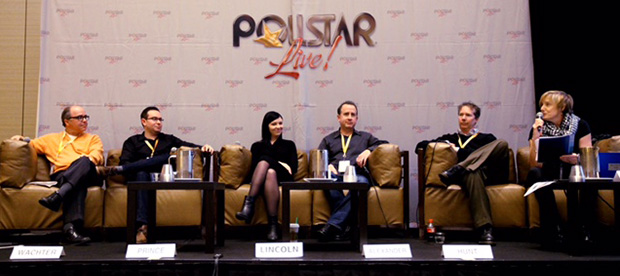Whether it’s (yet another) new venue, festival, or gladiator 5k chipping away at entertainment spend, venue managers continue to face the fierce challenge of filling seats and calendar dates. IAVM’s Pollstar session, moderated by Kim Bedier, CFE, IAVM chair and director of public assembly facilities for the City of Tacoma, dove straight into some of the creative ways venue managers are evolving their buildings (and operations) to thrive in an ultra-competitive environment.
Resch Center, Green Bay, Wisconsin
Ken Wachter, president with PMI Entertainment Group, shared several examples of projects at the Resch Center that are working in their market. Neighbors to Green Bay’s Lambeau Field (they share the parking lot), Wachter and team found ways to capitalize on the fact that—for at least eight Sundays a year—the equivalent of 25 percent of the entire city’s population gathers to hang out, tailgate, and be Cheeseheads in support of the Packers. PMI shares 400 part-time staff with Lambeau Field to assist in game-day operations, but they also have developed their own opportunities.
“We decided to rent out as much available space as possible to tailgaters,” Wachter said during the panel discussion. “We have a $35 all-you-can-drink beer pass and club areas for VIP groups. We’re now averaging about 3,000 fans on our property every game day.”
PMI also fulfills concession orders (and handles clean up) for tailgaters in the parking lot, a profitable extension of their game-day efforts since their food and beverage is handled in-house.
In addition to the tailgating, PMI found another game day opportunity.
“Lambeau’s seating is primarily benches, so we rent out about 8,000 seat-backs to fans each game day,” Wachter said. “They sell out every time.”
One word of advice from Wachter on renting seat-backs is to not brand them to the team.
“Keep them ugly … otherwise you’ll never get them back.”
Beyond Packers game days, PMI has a mix of tenants and in-house events that help keep the venue busy. They are the owners of the Green Bay Gamblers hockey team, and with two of the venues on the property able to house the games, they have great flexibility in booking shows that overlap with the hockey season. Add into the mix college basketball and arena football, and PMI is handling around 50 sports dates on the calendar each year.
With in-house food and beverage and ticketing, PMI produces 15 events a year that bring in an additional $1 million in revenue on previously dark days. In addition to the Wedding Show, a Taxidermy Show, and the Halloween Sweet Street, PMI also produces the Tall Ship Festival, an off-site riverfront event that brings tens of thousands of visitors to Green Bay.
BancorpSouth Arena, Tupelo, Mississippi
He left a packed house of Jason Aldean fans the night before for an early morning, nine-seater into Nashville. Todd Hunt, director of the BancorpSouth Arena, joined the panel to offer his perspective on the challenges venues face.
Unlike the Resch Center, Hunt shared that sports tenants do not work as well in their market. Tupelo is only 35,000 people, so too many blocked dates (and the challenge of sustained ticket sales) keep the venue less flexible in bringing in relevant content.
However, where a hockey team wasn’t ideal, being the only ice rink in a 90-mile radius is. Skating events have proven to be a more relevant use of the ice and are now bringing more than $100k in profit to the arena.
Selling the arena as rehearsal space was also mentioned, as Hunt remarked that, “It’s good for our crew to get practice, and it tends to be good for local bars.”
Other successes mentioned by Hunt were in capacity conversions—using floor-to-ceiling curtains to take the 9,000-seat bowl down to 7,000, 5,000, or 3,000. This makes the arena—originally converted from a shopping mall—ready to handle concerts, theater, and other events that thrive in smaller configurations.
For Hunt, it is about knowing what his market can sustain.
“The worst thing is for a show to come and fail, and what that then says about Tupelo, Mississippi,” he said.
Venue Coalition
Representing a network of more than 60 arenas, Andrew Prince, executive vice president with Venue Coalition, shared that venue reinvention is relevant for the local community and for agents deciding where to book shows.
Knowing what will motivate a particular act matters. Having a venue that feels accessible to the community, supports charities, and is welcoming helps a venue stand out.
The Forum, Inglewood, California
A $100 million-dollar renovation can also help usher in reinvention. Geni Lincoln with the Madison Square Garden Co. detailed the recent rebirth of the “Fabulous” Forum in Inglewood, California.
Beginning with the back of house, Lincoln described redesigned dressing rooms that connect to meet-and-greet areas, an artist gym, and a new production area for crews that includes its own showers. Combined with new seating and improvements to the acoustics in the arena, the new experience at the Forum is noticed by guests.
“When acts like it, they talk about it,” Lincoln said.
Tacoma Dome, Washington
Renovations and improvements to the venue are relevant for the Tacoma Dome, as well. Tom Alexander, booking manager at the Dome, described the process of “putting yourself in your guest’s shoes, then building a priority list of improvements that will matter most to them.”
For the Tacoma Dome, what matters to more than a few members of its community is a piece of art designed for their roof back in 1983. Bedier mentioned that a mural design for the Dome, submitted by Andy Warhol, has received approval by the city council and is now awaiting the $5 million in funding required to make it a reality.
At the airport later that day, I ran into a fellow Pollstar attendee. I asked if they had by chance attended the IAVM session that morning. The reply was the perfect summary of all of the examples shared by the panel.
“It was the most practical session of the entire conference.”

